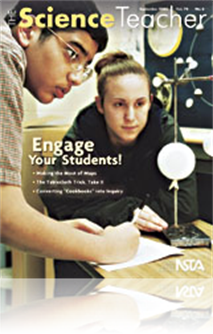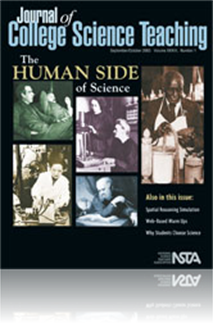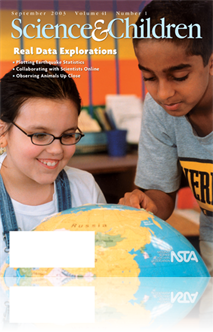All Resources
Journal Article
Student activities illustrate the importance of light and color in space exploration. By exploring the electromagnetic spectrum with powerful and specialized telescopes, scientists can tackle some of the most fundamental human questions: “Where did...
Journal Article
Astronomers can use light from stars to determine the elements in a star, but how do they determine the quantity/amount of these elements within a specific star?Why do we always see the same side of the Moon from Earth? Find the answers in this artic...
Journal Article
Eyes on Planet Earth! Exploring Your Local Watershed
Encourage students to investigate their local watershed and become involved in assessing and monitoring the quality of water with the help of this month's poster from the American Geological Institute. ...
Journal Article
Home Connections: Demystifying Mixtures
The subject of chemistry makes most people think of an elaborate laboratory, but investigating chemistry concepts does not require expensive equipment or chemicals. You can perform some of the same tests scientists do using materials in your home. On...
Journal Article
A Native Species Restoration Project
Get your students involved in the community by researching, collecting, growing, and re-introducing native plants to your area. Find out how students in Arizona landscaped their community using plants that required very little water—a technique kno...
Journal Article
Editor's Corner: Keep It Simple!
The Science Teacher’s editor shares thoughts on the current issue that is packed with ideas on using inquiry effectively and "Keeping It Simple."...
Journal Article
Research and Teaching: Preparatory Versus Practice Homework
The appropriate use of homework is unclear. The authors compared the performance of students who did two different types of homework—preparatory (before class) and practice (after class). They also tested student performance against that of previou...
Journal Article
Fun with Buoyancy: Students gain insight on Archimedes' principle through a novel buoyancy lab
Through a novel buoyancy lab, students learn and sharpen skills in measurement and gain insight on Archimedes' principle. This activity provides an engaging method for getting the buoyancy concept across to students and is an excellent vehicle for in...
Journal Article
Coordinating Physics and Education Instruction
This article describes a university science course that integrates physics, education, and community outreach. The class both improves student mastery of science and teaching as well as addresses the university’s mission to pursue research, educati...
Journal Article
Density on Dry Land: Demonstrations without buoyancy challenge student misconceptions
Alternative activities without buoyancy explore density with solid materials and challenge student misconceptions. ...
Journal Article
Gain rich perspectives about the interrelationships between science, technology, and society through explorations of history and the process of science. ...
Journal Article
Science Sampler: Using graphic organizers
The use of graphic organizers is an effective tool for improving students' ability to extract important information from expository text....








